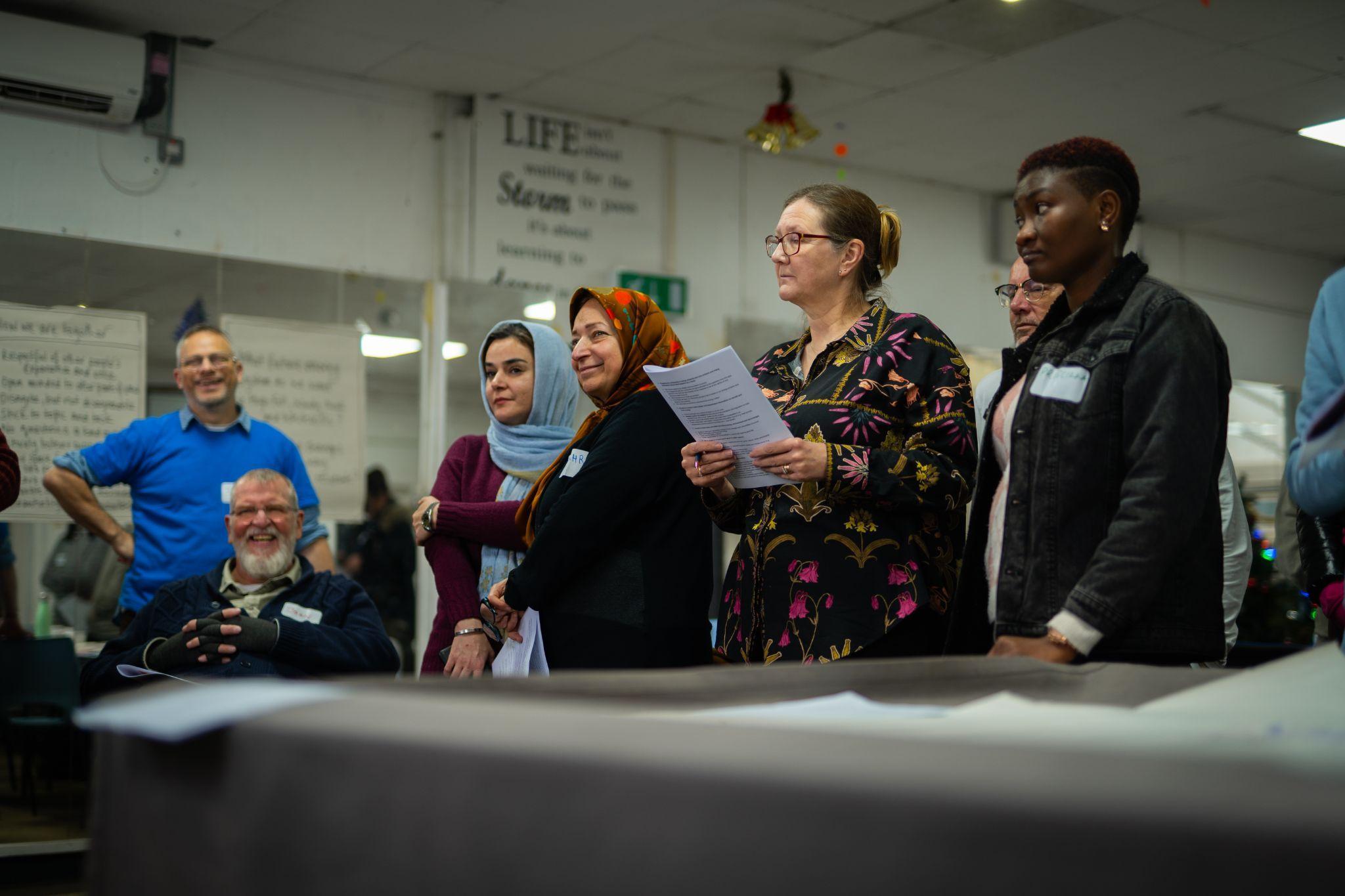Final report January 2025
BlackpoolCommunity Conversation

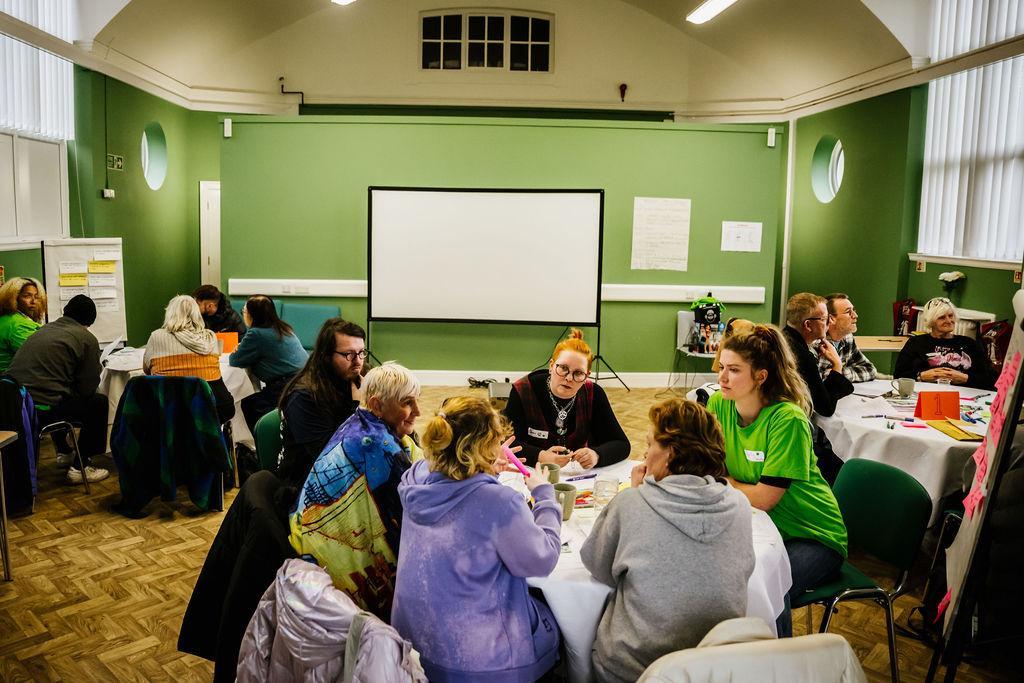
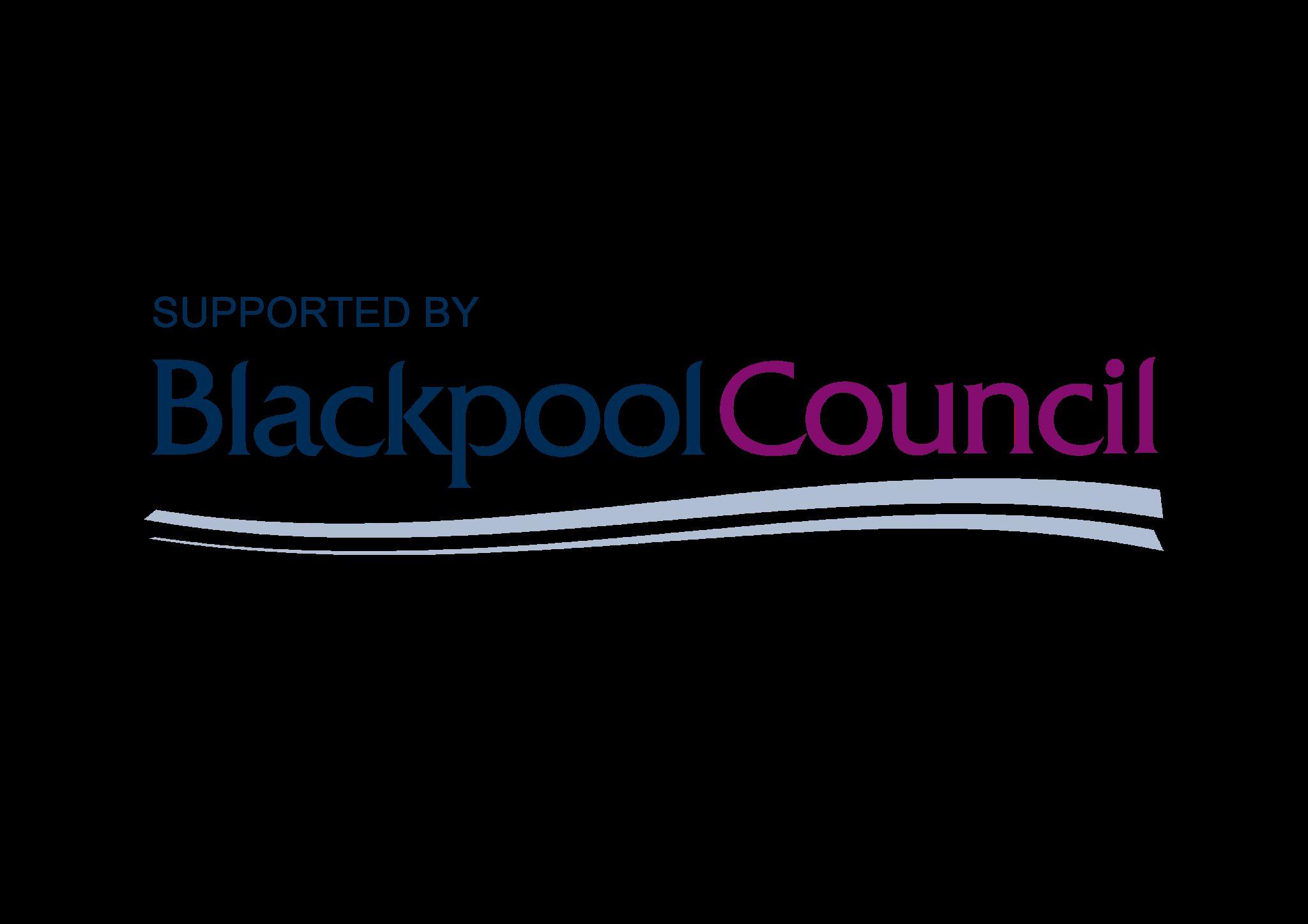




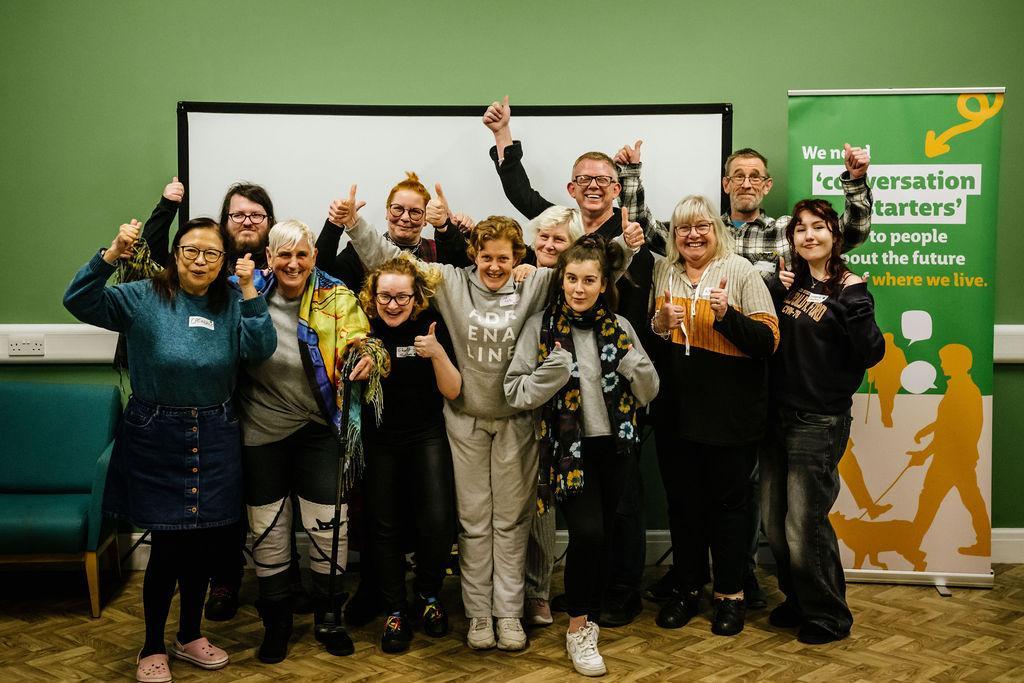

12 out of 15 participants (those who consented to having their photo taken).

Withthanks
With thanks to the 15 ‘conversation
starters’ who contributed their time, energy and ideas to the Blackpool Community Conversation: Adam, Catherine, Charley, Chris, Christina, Glennis, Isabelle, Jake, John, Kathleen, Kirsty, Lisa, Marc, Matthew and Morag
With thanks to Innovate UK who funded this work as part of the Net Zero Living programme.
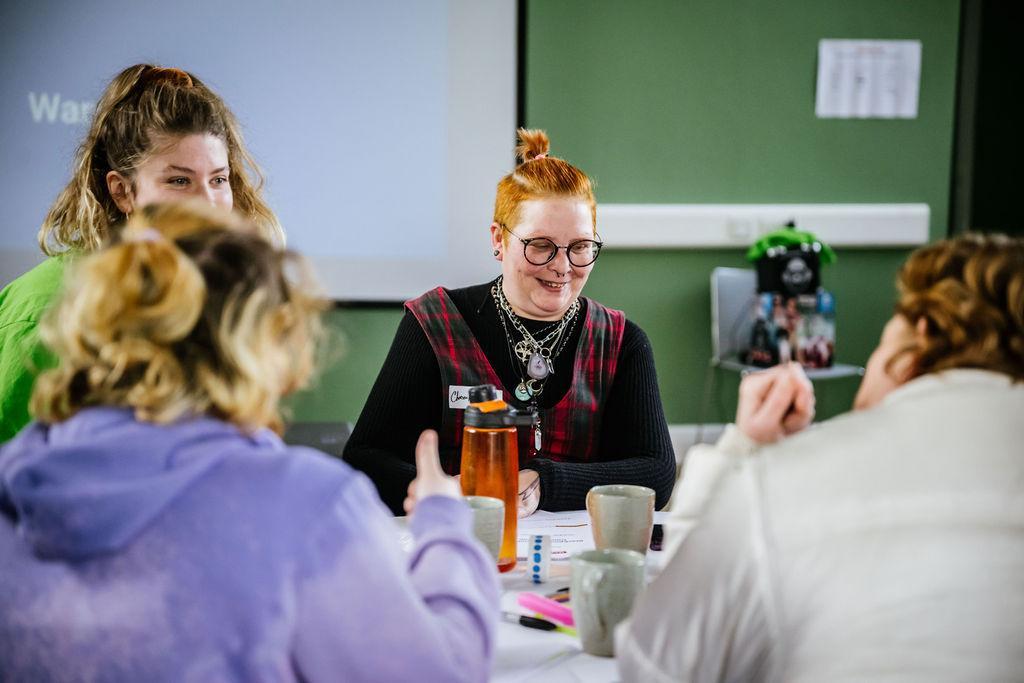
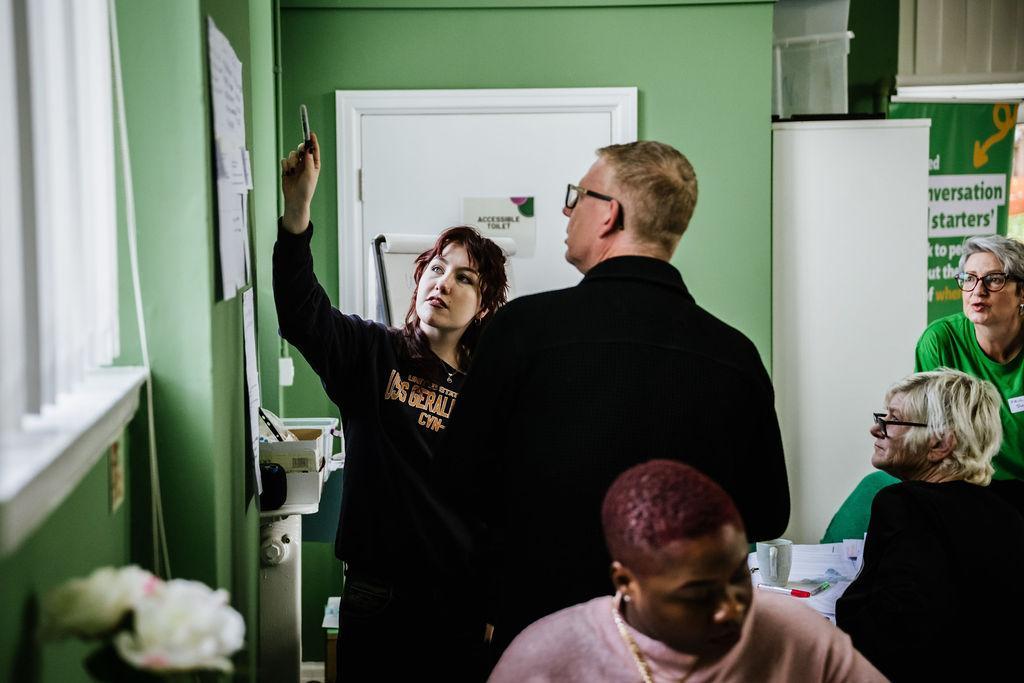

Executivesummary
Blackpool, like all coastal towns across the UK, is already experiencing the impacts of climate change. The town-wide Climate Adaptation Strategy will set out how Blackpool prepares for these impacts.
As part of Innovate UK’s Net Zero Living programme, Involve, Forum for the Future, Ipsos and Quantum Strategy & Technology ran a Community Conversation. The aim was to put citizen ambitions for the future of their town at the heart of the council’s climate adaptation response.
The process brought together 15 ‘conversation starters’, a group of residents broadly reflective of the town across demographics (see Who took part?).
Through four in-person sessions, the group learnt about climate change, local impacts and the co-benefits of action from a range of speakers.
Over three weeks, the conversation starters led over 50 discussions with friends, family and neighbours
about what would make Blackpool an even better place to live in future.

The group used what they had heard from speakers, as well as the wider community, to agree a vision and set of recommendations for Blackpool in 2035.
In response to the group’s recommendations, Blackpool Council will:
● Publish the vision and recommendations on the council website
● Publish a formal response to all recommendations, incorporating responses from other parties who may be responsible
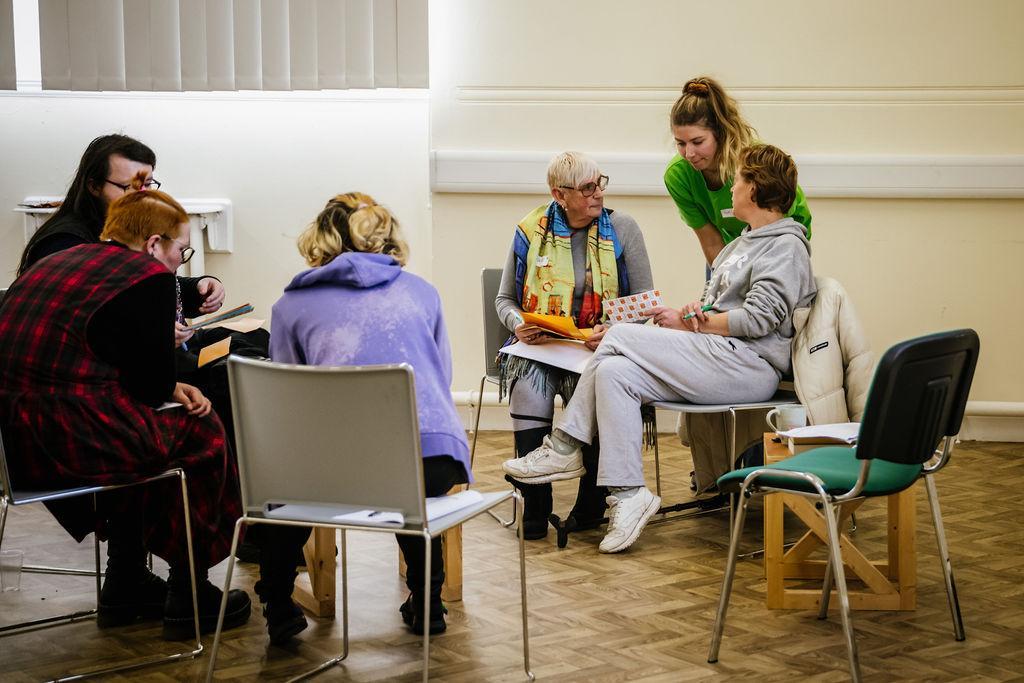
● If there are any recommendations the council is unable to take forward, the reasoning will be clearly set out and alternatives will be suggested
Blackpool Council is also exploring how they use this method as a pilot and continue Community Conversations across the town as part of their ongoing climate response.

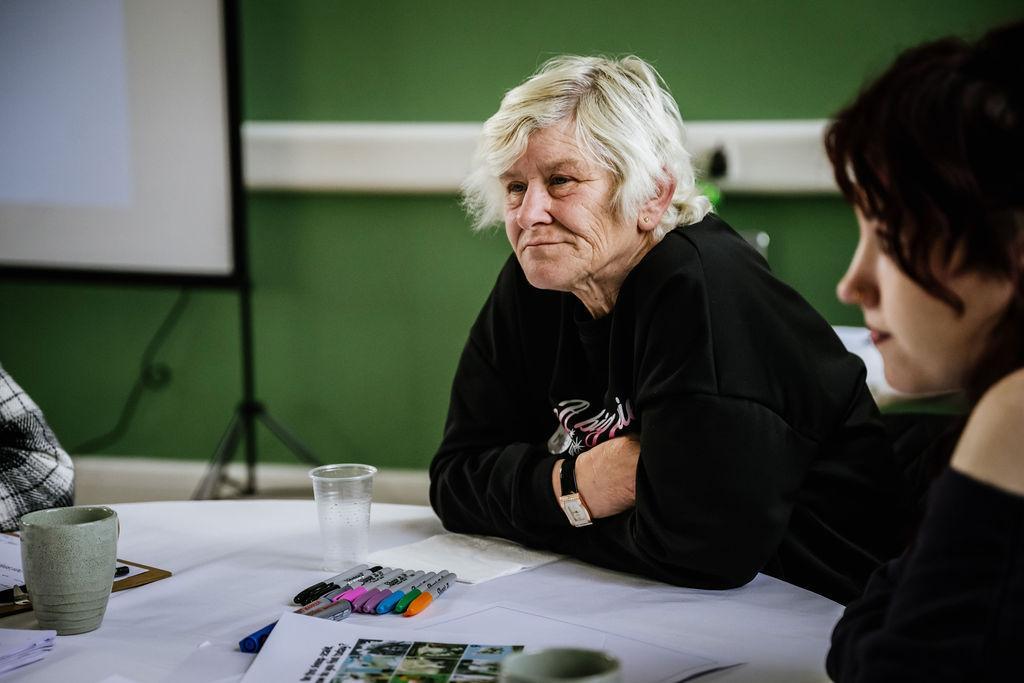

Background

Projectorigins
Why climate adaptation?
Human activity has already altered the climate with impacts including sea level rise, flooding and extreme heat. In 2024, Blackpool Council published a plan for its services and wholly owned companies to prepare for these impacts.
Following on from this, the council is now preparing a town-wide Climate Adaptation Strategy. The council identified the opportunity to involve residents in developing a vision for Blackpool in 2035 to ensure the strategy responds to what is important to local people.
Why a community conversation?
Since declaring a climate emergency in 2019, the council has been consistently putting residents at the centre of their response to climate change.
This includes running a citizens’ climate assembly in 2021. The council was interested to build on this and pilot an approach with communities who have been less involved to date.
What question did this process set out to answer?
The council were keen for outputs of this process to call for a collective response to climate change across business, voluntary/community groups and households, as well as the council themselves.
The question was also designed to see climate adaptation as an opportunity to improve the town for local people.
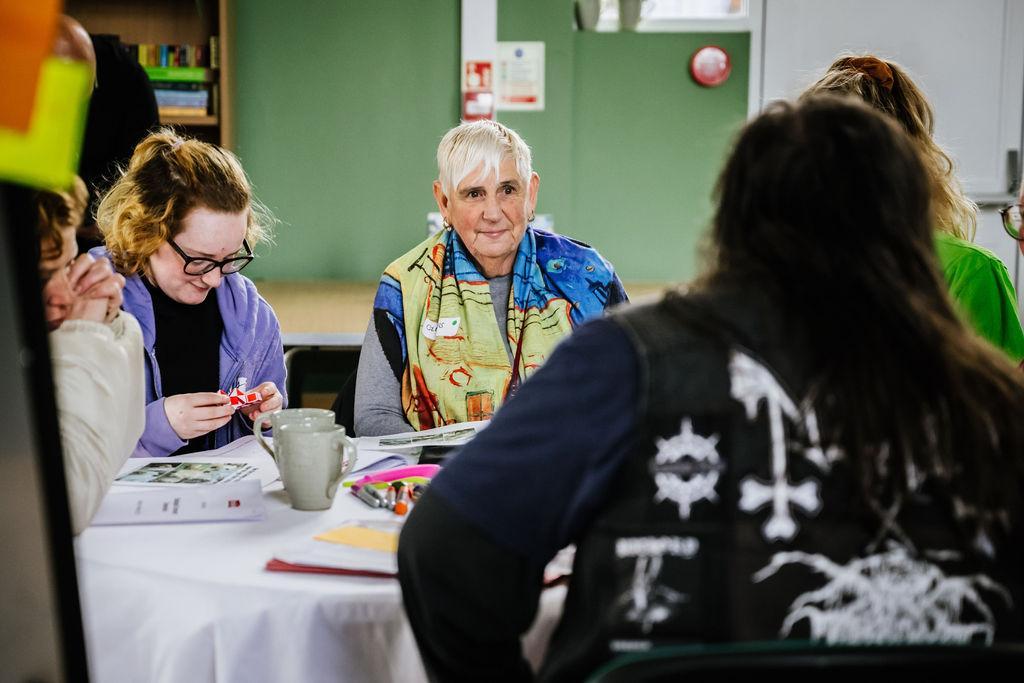
In response to this, the final question was:

What can we all do to prepare for the impacts of climate change, whilst making our town a better place to live?
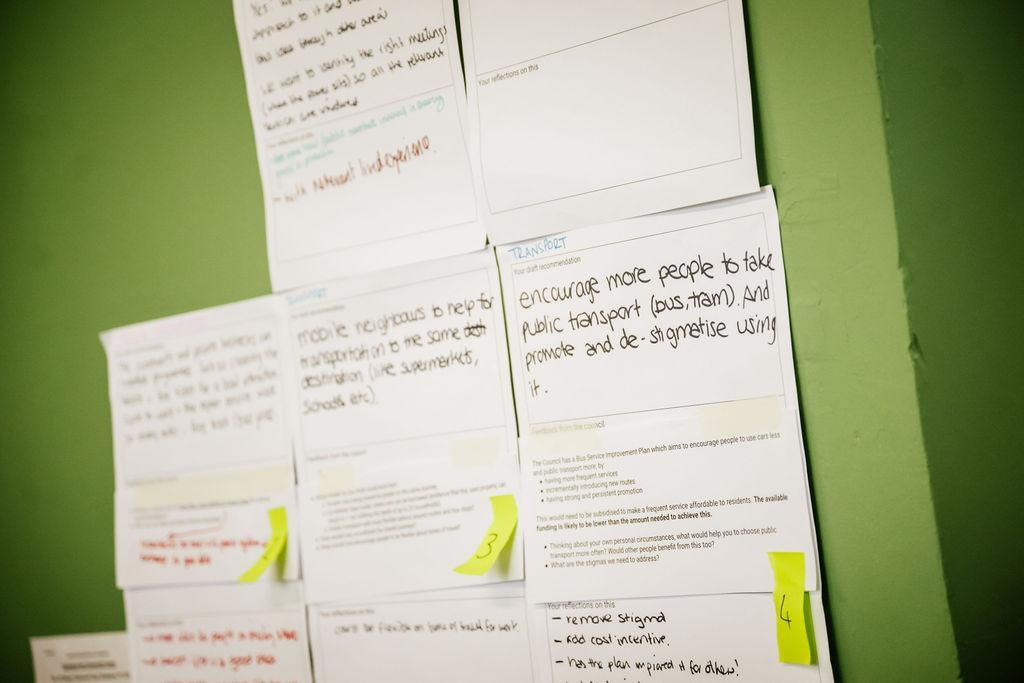

Thequestion
What can we all do to prepare for the impacts of climate change, whilst making our town a better place to live?



Asset-basedconversations
This project was designed around the principle of building out from what is important to people, rather than being driven by an ‘outside in’ agenda of reaching net zero.
Conversation starters were trained to put this into practice, by starting discussions in their community on what makes Blackpool unique and how this can be built on in future.
The conversation was not a way to ‘consult’ on specific ideas the council has, or conduct qualitative research that produces detailed transcripts. Instead, these asset-based conversations were seen as another form of learning to inform the group’s final prioritisation and decision making. In this way, this process values lived experience in equal measure to the specialist expertise from speakers.
Theconversationscript
1. Where would you say your home is - the area you know really well in Blackpool?
2. What makes it a good place to live? And what makes it different from other places?
3. How would you like to see Blackpool become an even better place to live in future?

4. This conversation is feeding into work the council is doing on climate change. Can you think of any ways we can do both - tackle climate change and make our town a better place to live?
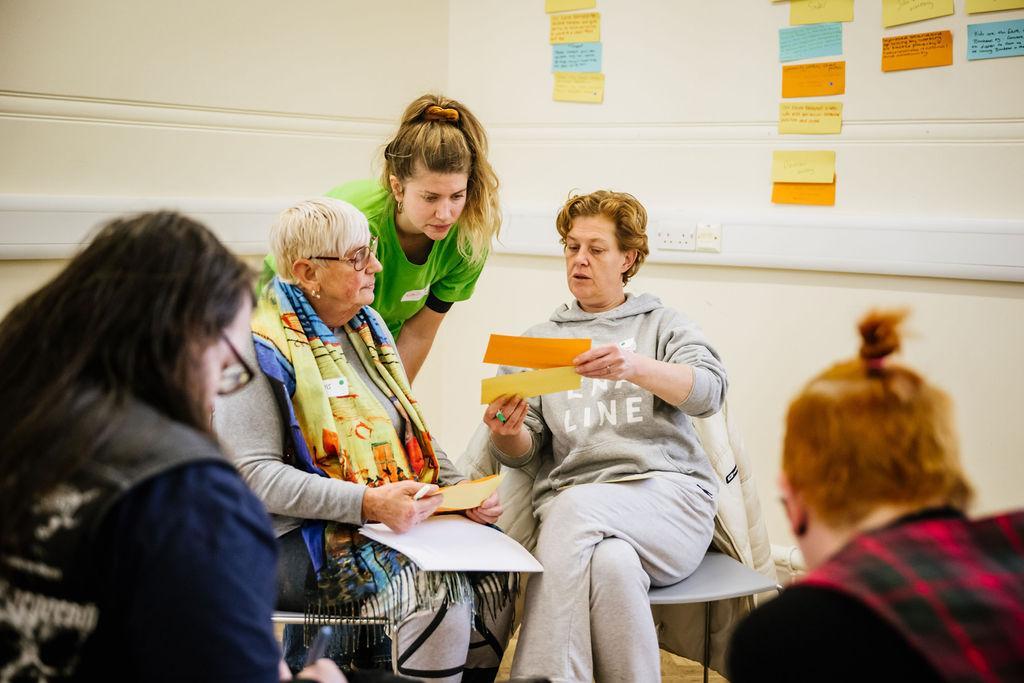

TheCommunityConversationataglance
Learning
Learning from speakers
The learning content was co-designed with participants. After an initial round of hearing from a range of speakers, they prioritised areas they wanted to learn more about. Topics covered an introduction to climate change, local impacts and solutions.
Deliberation
Participants discussed the information they had heard and developed a long list of ideas, weighing up potential ways forward. The council’s climate team reviewed these and provided feedback.
Decisionmaking
Participants worked together to review feedback from the council and agree on:
● A final vision statement
Learning through conversations
Through conversation with family, friends and neighbours, the participants learnt about the wider community’s aspirations for the future of Blackpool.

● A set of priority recommendations

Sessions1and2
The conversation starters came together through four in-person sessions over the course of a month.
The first weekend consisted of an evening and the full following day.
On the first evening we welcomed participants and developed a group agreement of ‘how we’ll work together’. Two speakers gave an introduction to the co-benefits of climate action and what the council is already doing to prepare for the impacts of climate change.
The following day, Rob Snape, Technical Lead at Climate Proofed, delivered a presentation on climate change and local impacts. Participants processed what they had learnt and identified any gaps in knowledge, prioritising two final speakers they would like to hear from.
We then spent the day training participants to have conversations, by co-designing a script and role playing conversations.
Participants left with a plan of action and an outline of how we could support them.
With thanks to our speakers:
● Scott Butterfield, Strategy and Climate Lead, Blackpool Council - What the council is doing
● Louise Marix Evans, Director, Quantum Strategy & Technology - Co-benefits of climate action
● Rob Snape, Technical Lead, Climate Proofed - An introduction to climate change and local impacts
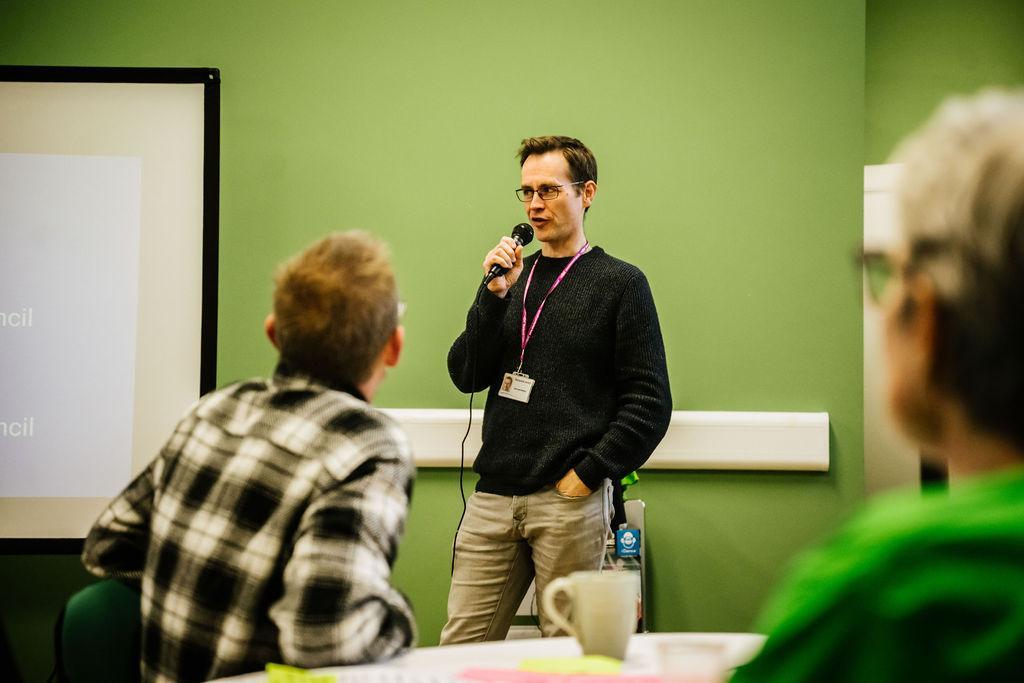

Sessions3and4
Three weeks later, after participants had completed their community conversations, we came back together for the final weekend.
Over two full days, participants shared back what they had heard from conversations. They identified where there was overlap with climate change and developed draft ‘ingredients’ for a vision statement.
Participants had requested to hear from two final speakers to fill any gaps in knowledge. They wanted to learn about agriculture, nature and wildlife and what was already happening to improve social housing.
With thanks to our speakers:
● Tom Burditt, CEO, Lancashire Wildlife TrustAgriculture, nature and wildlife
Participants finished session 3 with a long list of suggested actions for the council to provide feedback on.
On the final day, participants reviewed feedback from the council on their suggested actions. This informed their final deliberation, where participants weighed up routes forward and prioritised a final nine recommendations.
Finally, the group worked together to write a vision statement from scratch and write up the recommendations.

The day finished with participants presenting their final vision and recommendations to decision makers, including the Chair of the Climate Change and Environment Scrutiny Committee.
● Stephen Dunstan, Climate Lead, Blackpool Coastal Housing - Improving social housing in a changing climate
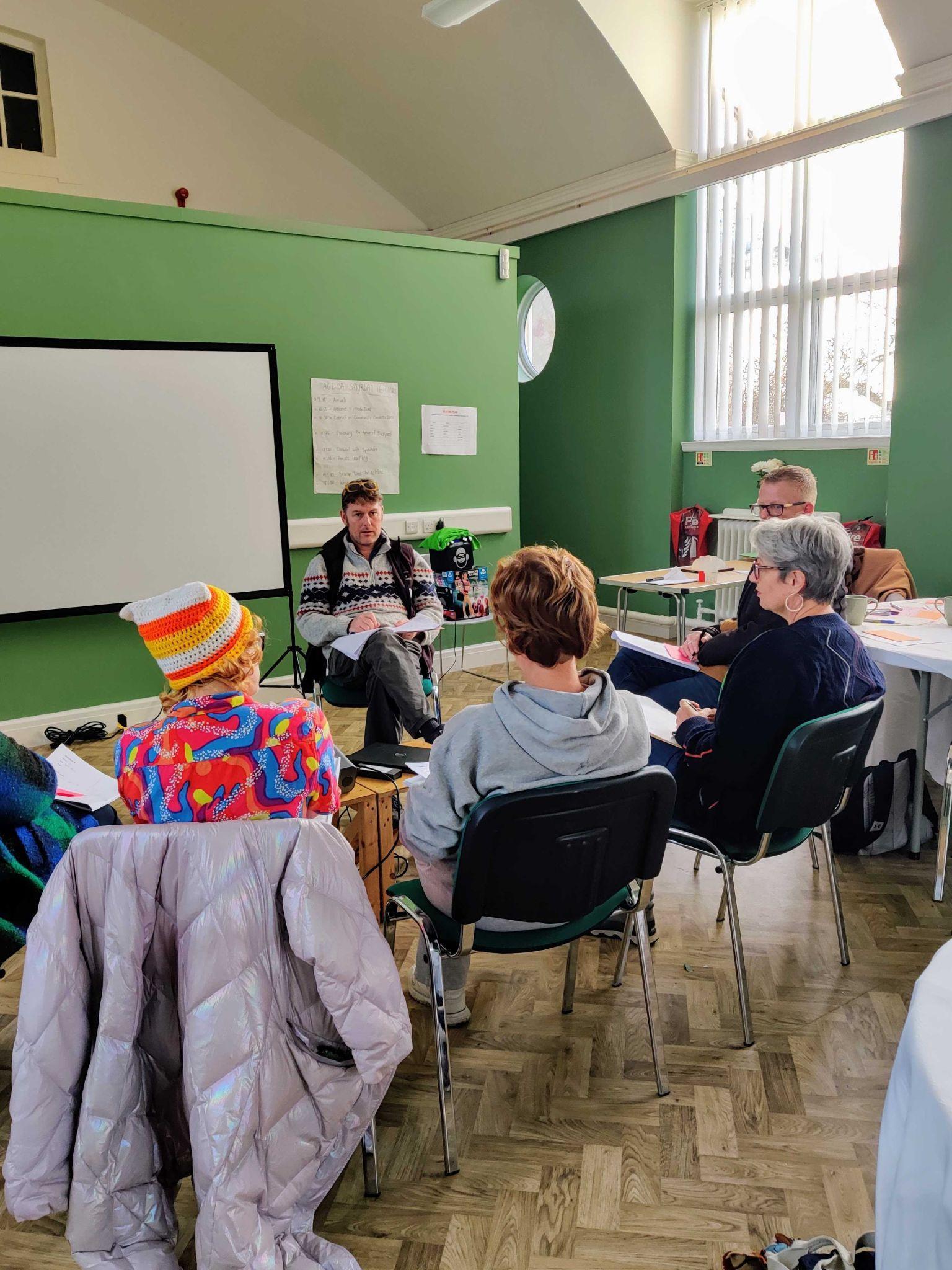

Whotookpart?
Whotookpart?
In total, 68 residents contributed to the Blackpool Community Conversation:
● 53 residents shared their ideas for the future of Blackpool through conversations
● 15 people, recruited to broadly reflect the population of Blackpool, deliberated and agreed the vision and recommendations
We selected 15 conversation starters from those who expressed interest in participating to be broadly reflective of Blackpool’s demographic profile (as outlined in 2021 census data).
Members of the group were given a £420 gift of thanks for participating in all sessions, to make participation accessible to all and in recognition of their time. We also covered travel and any additional costs such as childcare.

Howwereparticipantsselected?
We used a mixed method approach to recruitment. This included sharing the opportunity through local community and voluntary groups, attending a foodbank, doing a pop-up stall, distributing posters/leaflets and posting on Facebook.
We targeted recruitment in the three wards (Claremont, Talbot and Brunswick) that have been less involved in the council’s climate work to date.

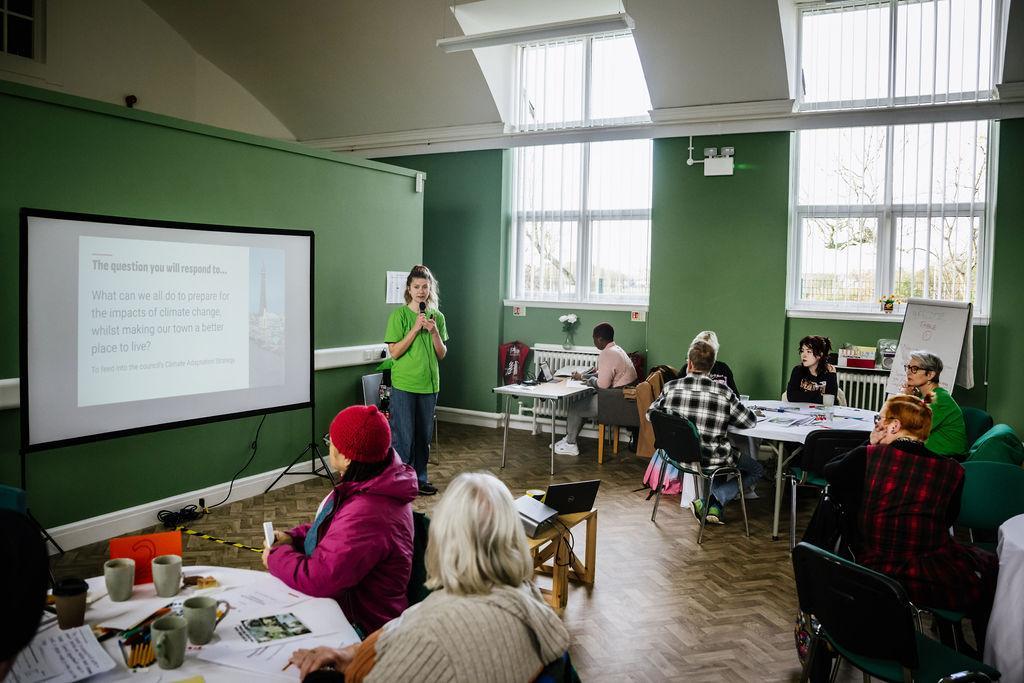
Interested residents completed a form to express their interest in taking part. From there, we anonymised applications and selected a group by computer to be broadly reflective of the town in terms of their: ● Age
Gender
Disability
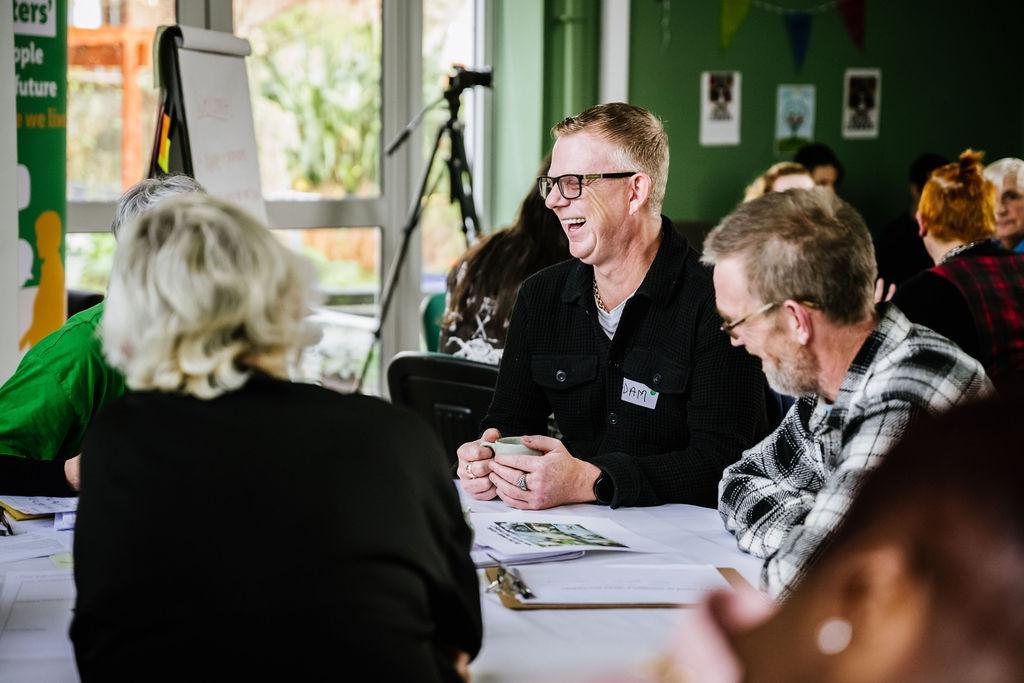
Education level
Attitudes to climate change
Makeupofthegroupataglance

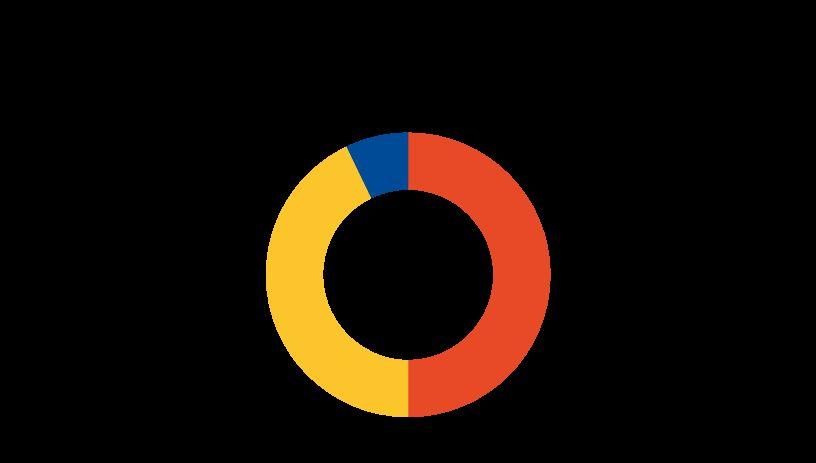
Please see the following slides to see how this compares to the town as a whole.
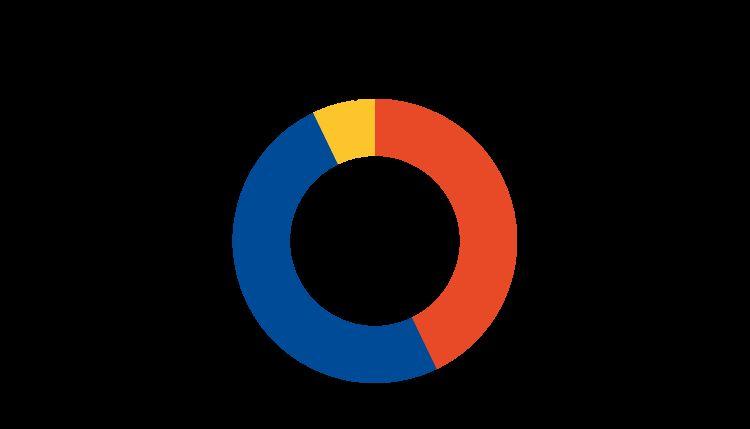





Recruitmentdetail
We agreed this recruitment criteria with Blackpool Council to ensure the final group would have a good spread across demographics and attitudes.
The tables opposite compare the target percentage (from the 2021 census data from Blackpool) with the makeup of the group.
As 94.7% of the Blackpool population identifies as White, ethnicity was not included in the priority set of criteria we used to recruit residents.
The recruitment of participants achieved a good spread of people across all criteria, even where slight variations from targets occured.
*Souce: Ipsos Political Monitor, July 2023
The final group slightly over-represented people who had a disability, compared to Blackpool as a whole.


The
BlackpoolCommunityConversationinnumbers
15 conversation starters took part, broadly reflective of the town across demographics
53 conversations took place between sessions, with participants’ friends, family and neighbours
5 speakers provided information and evidence about the topic, in addition to conversations with family and friends

420 personhours of learning, conversations, deliberation and writing recommendations
9 final recommendations deliberated, agreed and written in participants’ own words
1 visionstatement developed by the group, written in participants’ own words


Visionandrecommendations
OurvisionforBlackpoolin2035
This vision statement was drafted from scratch in participants’ own words.
Our future Blackpool has improved housing through insulation and energy efficiency, which helps the climate and residents through cheaper energy bills powered by renewable energy.
Homes are affordable, accessible and warmer creating a more safer and stable community. For example, using empty buildings to create new homes and businesses.
The future Blackpool should have less cars through the town centre, be more pedestrian and cycle friendly and have more affordable public transport.
Mobilising and harnessing the potential to realise our vision of a brighter, greener, more environmentally friendly future, making Blackpool ready to adapt to climate change.
The future of Blackpool would benefit from greener parks, cleaner beaches and less pollution, with tree lined streets and living walls, that are respected by tourists.
Our Blackpool should be community focused and available to everyone of all generations, encompassing every aspect of our diverse community.
We are listened to and taken seriously, respected and feel safer. This would include more awareness and activities to come together, for example at local community hubs, which will help tackle anti-social behaviour and crime.
The council and community could improve standards of living by working to tackle the underlying causes of poverty and homelessness.
Informing residents about climate change, and providing examples and schemes that they can do to combat it.
Make climate change and environment a subject in school.
Children are the future of Blackpool - we need to listen to their needs and suggestions while creating career opportunities to give them a reason to stay.
These will contribute to improved mental and physical health, and have positive benefits for the climate and the community.


Participants’recommendationsonpriorityactions
Participants drafted these recommendations from scratch. They are included in full, in participants’ own words on the following pages.
Where we have made slight edits to ensure sentences make grammatical sense, these are included in hard brackets.
Housing Make sure housing is adequate, affordable and suitable for everyone, making it more environmentally sustainable for the future
The council to use incentives or put pressure on private builders to build with a high standard of energy efficiency and sustainability
Transport The council, Blackpool Transport and private business strengthening existing public transport and making it more accessible, cheaper and environmentally friendly
Greening
More green spaces in built up areas by planting street trees and depaving areas
Utilising back alleys and public spaces for community gardens, wildlife corridors and relaxing areas to help mental health
Community engagement
The council and private business to run incentive programmes
Educating children in climate change
Decision making The council to communicate better to ensure services are talking about interconnected issues
People with lived experience to be actively involved in decision making within steering groups for different departments to build and develop an overall plan for community engagement and environmental changes
Wewouldliketomakesurehousingisadequate, affordableandsuitableforeveryone,makingitmore environmentallysustainableforthefuture.
Toinclude:Housinginsulation,Helptoaffordaproperty,Renovatingemptyproperties
Whythisisimportantto prepareforclimatechange impacts…
• Reduction in energy when the home is insulated
• Less energy = less greenhouse gases
Apracticalfirststepforour communityandindividuals…
• The funding [is made] available from the council and organisations

Apracticalfirststepforthe council…
• Introduce schemes to help subsidise housing costs and help towards mortgages, supporting buyers
• Identify properties which are unused and investigate the possibility of reuse
Wewouldliketosee[thecouncil]touseincentivesor putpressureonprivatebuilderstobuildwithahigh standardofenergyefficiencyandsustainability.
Whythisisimportantto prepareforclimatechange impacts…
• Need the improvement of standards to change the climate impact
Apracticalfirststepforour communityandindividuals…
• Get in contact with local MPs to put pressure on government
• Community campaigns for better standards
Apracticalfirststepforthe council…

• Put pressure on government to change legislation
Wewouldliketoseethecouncil,BlackpoolTransport andprivatebusinessstrengtheningexistingpublic transportandmakingitmoreaccessible,cheaperand environmentallyfriendly.
Whythisisimportantto prepareforclimatechange impacts…
• More people would use public transport more instead of using cars, reducing carbon [emissions] in the environment
• More people benefitting [from] and on local transport
Apracticalfirststepforour communityandindividuals…
• Share and learn about public wants and needs. Learn if people already agree.

Apracticalfirststepforthe council…
• To have more accessibility training for bus driving staff [and make buses wheelchair accessible]
Wewouldliketoseemoregreenspacesinbuiltup areasbyplantingstreettreesanddepavingareas.
Toallowwildflowerstobloom:improvingbiodiversitywhileprovidingacooler moreattractiveenvironmentpromotingmentalhealthbenefits.
Whythisisimportantto prepareforclimatechange impacts…
• Save trees and wildlife
• Combat biodiversity and nature crisis
Apracticalfirststepforour communityandindividuals…
• To sow seeds and plant trees
• To help maintain them e.g. watering in dry weather where appropriate

Apracticalfirststepforthe council…
• Provide seeds, trees, advice and support
• Encourage businesses to green up their areas
• Agriculture classes opened to the general public free
Wewouldliketoutilisebackalleysandpublicspacesfor communitygardens,wildlifecorridorsandrelaxingareas tohelpmentalhealth.
Alsotosupportcommunityplantinginallotments,windowboxesoralleyswitha priorityonpollinatorfriendlywildlifesuchasnettles,brambles,buddleiaandviolets.
Whythisisimportantto prepareforclimatechange impacts…
• Promotes biodiversity and a local understanding of the importance of plantlife
Apracticalfirststepforour communityandindividuals…
• Start planting / gardening groups
• Sharing and co-opting resources which will help with costs

Apracticalfirststepforthe council…
• Allocate space for depaving and/or offer incentives e.g. [provide] free compost [for] window boxes
• Make public aware of schemes in their neighbourhood
Wewouldliketoseethecouncilandprivatebusiness torunincentiveprogrammes. Forexample:
● cleaningthebeach=freeticketstoalocalattraction
● cycletowork=freerepairservice
● walkingsomanymiles=freetrain/buspass
Whythisisimportantto prepareforclimatechange impacts…
• Minimise the impact of climate change
• Get more people involved in climate action
Apracticalfirststepforour communityandindividuals…
• Share their wants and needs about it - how many people would want this?

Apracticalfirststepforthe council…
• Conduct this survey [of how many people would want or use this]
– Needs steering group to steer
• Explore options [for] development e.g. apps, schemes etc
Wewouldliketosee[thecouncil]educatingchildrenin climatechange.
Toinclude:Getspeakersintoschools(e.g.politicalandspecialists),litterpicking schemes,encouragethemtogivetheiropinions,cleaninguptheseasideandgrasses, teachthesciencebehindclimatechange,theenvironmentandco-benefitsofaction (e.g.healthandwellbeing)

Whythisisimportantto prepareforclimatechange impacts…
• Children need to understand what climate change is and why it’s important for their future
• Children are the future
• Impact on health and wellbeing
Apracticalfirststepforour communityandindividuals…
• Teach it in schools for education
• Organise litter picking / beach clean ups in community and schools
Apracticalfirststepforthe council…
• Organise speakers in schools and events
• Ask for funding and help from higher [education] organisations
Wewouldliketoseethecounciltocommunicatebetterto ensureservicesaretalkingaboutinterconnectedissues. Councildepartmentsneedtotalkinpersonsotheyareintheloop.
Whythisisimportantto prepareforclimatechange impacts…
• Communicating more would be time saved
• [Climate change is a] time sensitive issue
Apracticalfirststepforour communityandindividuals…
[Left blank by participants as this was seen as a recommendation for the council]
Apracticalfirststepforthe council…

• Make the effort to reach out to departments in person
Wewouldlikepeoplewithlivedexperience[tobe]actively involvedindecisionmakingwithinsteeringgroupsfor differentdepartmentstobuildanddevelopanoverallplanfor communityengagementandenvironmentalchanges. Includinghousing/transportetc-permanently,notoneoff.
Whythisisimportanttoprepare forclimatechangeimpacts…
• A local voice for local people
Apracticalfirststepforour communityandindividuals…
• Local people to start steering group
• Involve schools and colleges in it
Apracticalfirststepforthecouncil…

• Council needs steering groups - oriented around the interconnected issues with climate change with community members
• The council need to listen to them [and be] more approachable
• Get in contact with the locals [using] leaflets and public engagement
– Don’t knock doors - annoys people, automatically turns them against you
– Remember that the public are not always tech savvy - [share the opportunity more widely, for example by using] posters etc

Participantexperience andinsights
Participantexperience
Pre-engagement questionnaire


Before engagement, all participants were concerned about climate change.
Half of participants said they were very concerned (5) about climate change, and the other half were slightly concerned (5).
This is in comparison to the wider public where 69% of people say they are ‘very’ or ‘slightly’ concerned.1
Participants understood the purpose of the engagement, but knew less about the council’s overall plan to combat climate change before taking part.
I know what my local authority is doing to combat climate change/meet net zero
I am confident that my contributions to this process will be used by local authority decision-makers
I understand the purpose of this citizen engagement project

After engagement, more participants agreed with statements on knowledge of the council’s plans and on understanding the purpose of the engagement, reflecting increased understanding. However, more participants disagreed with the statement on confidence that their inputs would be used by decision makers.

Participantexperience
Post-engagement questionnaire
Participants were overwhelmingly positive about the process, all rating it 5 stars
Please describe how you are feeling at the end of the Blackpool Community Conversation:




The vast majority of participants were satisfied with the communication and support, that other participants respected what they say, and with the ability to ask important questions to them.


Participantexperience
Post-engagement questionnaire
Participants expressed what impacts they hope to see from this engagement project, which revolved around creating a better place to live, increased opportunities to get involved in, and transparency on the council’s plans.
For me/my household

“To have housing improved to ensure local residents are being looked after”
In the local area

“A significant increase in green spaces”

“Hopefully to [implement] some or all of our suggestions”
“Better understanding of the impacts of climate change and what individuals can do”
“More community engagement and co-production to ensure residents are central to the council's decision making”
“Improvement, particularly around housing and ensuring housing developments being built are beneficial to the climate change strategy not detrimental to it”
Response rate:
Pre-engagement: 10 responses
Post-engagement: 14 responses
TTaking part in a Community Conversation allowed me to express my opinions and understand new perspectives Isabelle, 19
IIt is worth doing. You get to meet new faces and discuss what other people want and how things can be improved talking to the right people. Lisa, 44


IIt is really fun to meet like minded people
and also get involved in a really powerful project that can help improve a time sensitive issue. Especially holding the council accountable and ensuring local residents are heard and their thoughts are acted upon.
Matthew, 25
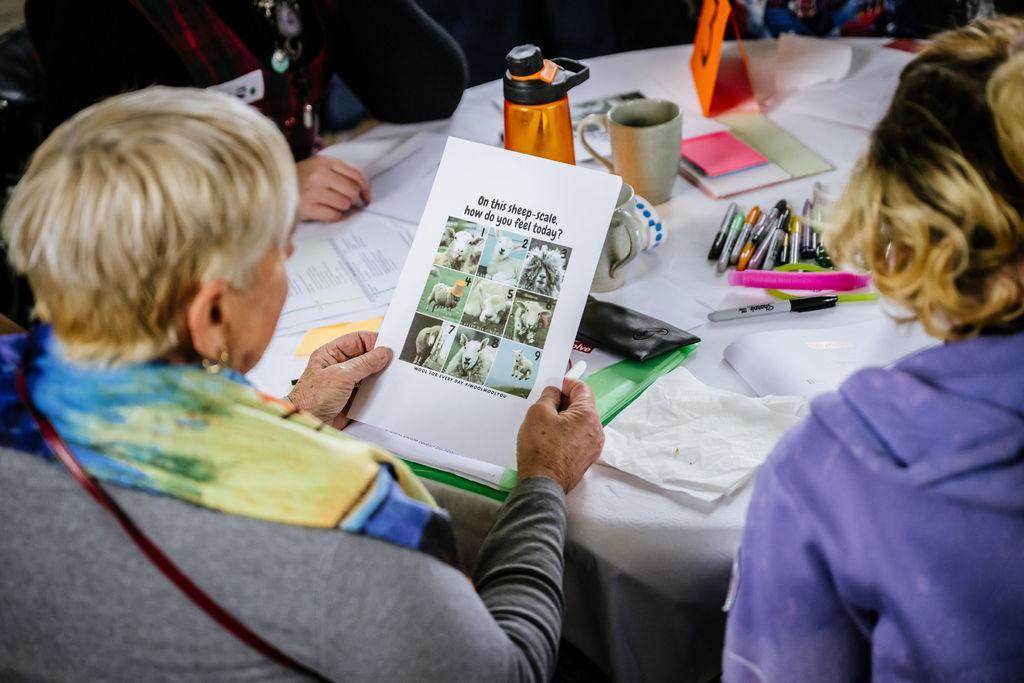


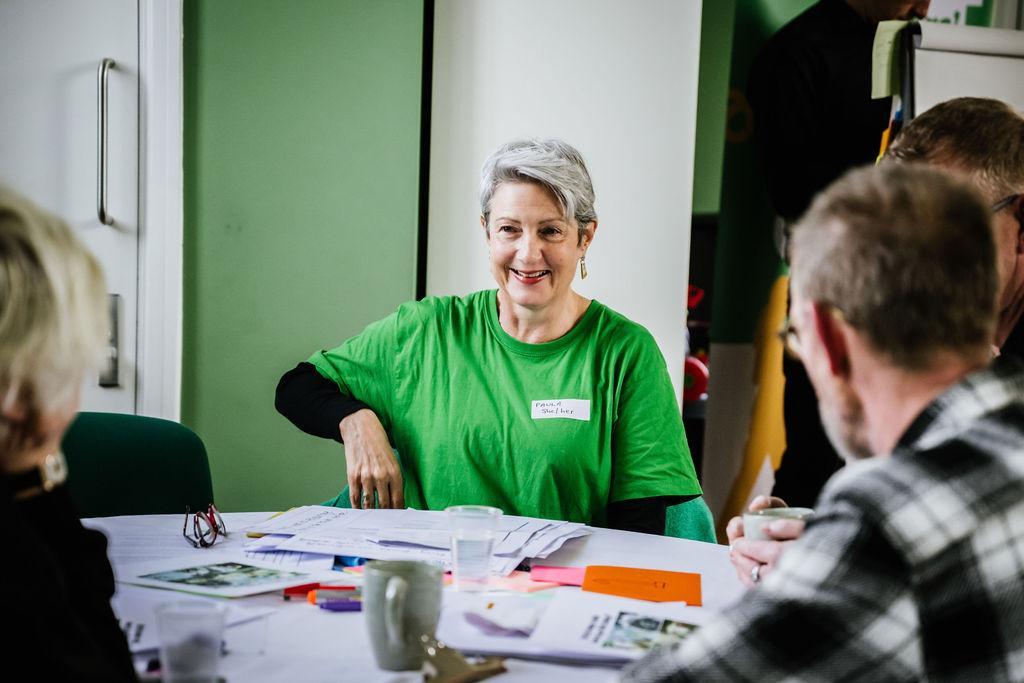

TTaking part in a Community Conversation has been very beneficial, I learnt a lot about climate change and the impact it’s had on our community
Adam, 44
I

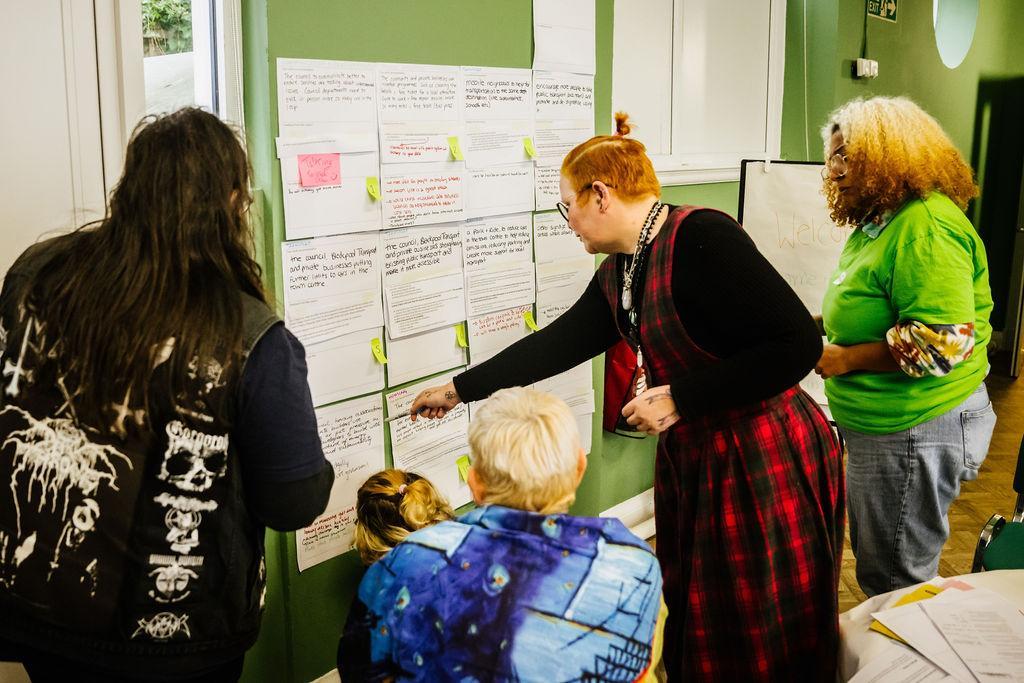
I feel I have broadened my understanding of climate change and other people’s opinions on the matter
Jake, 26
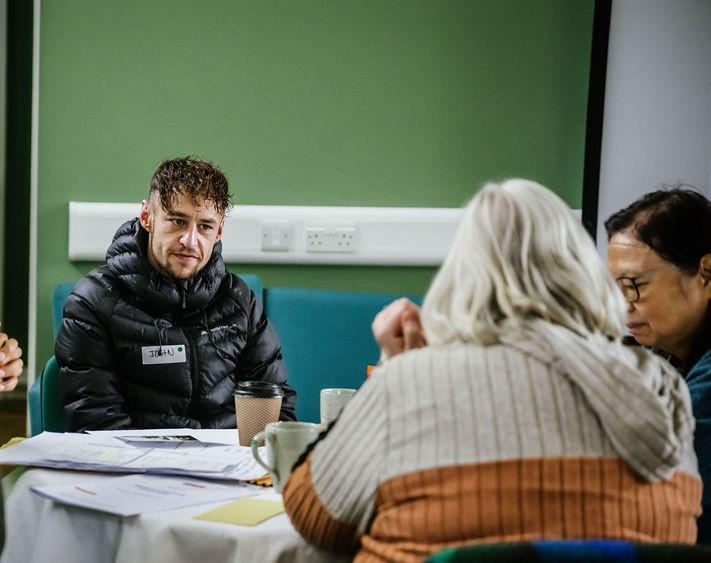

OOur vision and recommendations are important because it will help support a better future for Blackpool and for our world, especially a greener one that's secure for our environment
Charley, 23
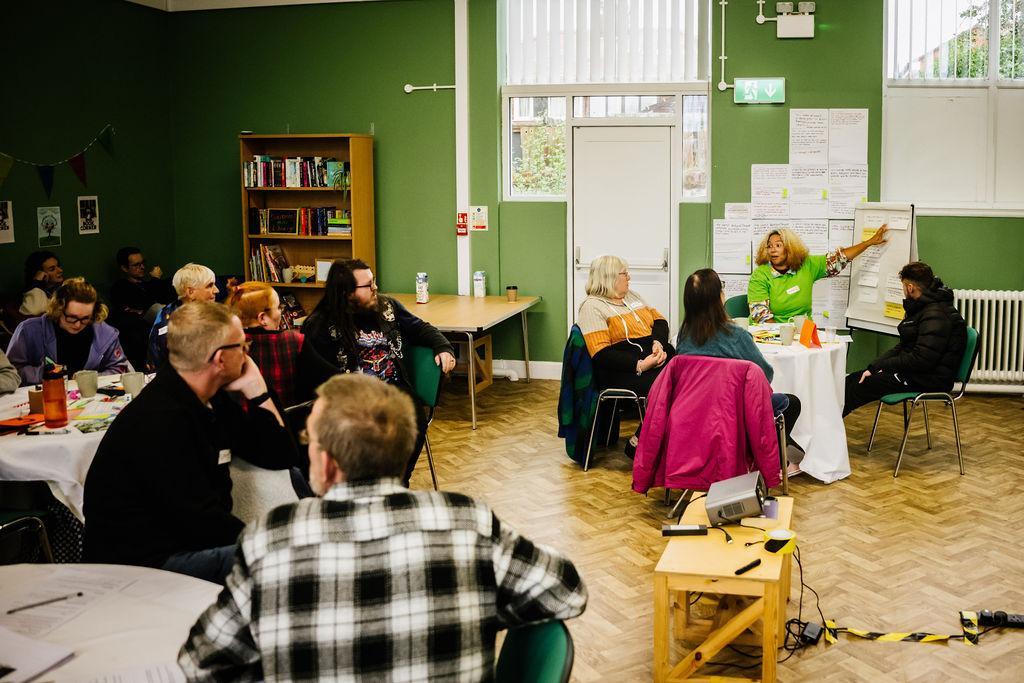

OOur vision and recommendations are important because it hopefully reflects the diverse opinions in the community
Chris
OOur recommendations are important because Blackpool needs to adapt to survive
Kathie




Insightfromthisprocessasapilot
This process was the first Community Conversation run as part of Innovate UK’s Net Zero Living programme. Insights from this process will inform how similar processes are run across the UK.
This process intentionally started with what matters to people and place. Through conversation, group members learnt about community aspirations for the future of their town and identified where there was a connection with the wider benefits of climate action. The result of this is a highly ambitious set of recommendations that cut across council departments. They have a strong emphasis on the co-benefits of climate action rather than being specific to climate adaptation. They therefore do not have a clear ‘home’ within the Climate Adaptation Strategy as per the original brief.
This demonstrates how citizen ambitions for their place do not fit neatly into local authority decision making structures. This is a trade-off which should be considered in the design of future processes.
A bottom-up approach that starts with what matters to people can produce some unexpected results which require coordination across institutions to deliver. A more tightly scoped brief could have produced some more specific recommendations, but may miss out on the genuine opportunity to see climate action as a transformative opportunity to improve our places.
This tension between institutional structures and citizen ambitions goes to the heart of our societal challenge of how we respond to and prepare for climate change.
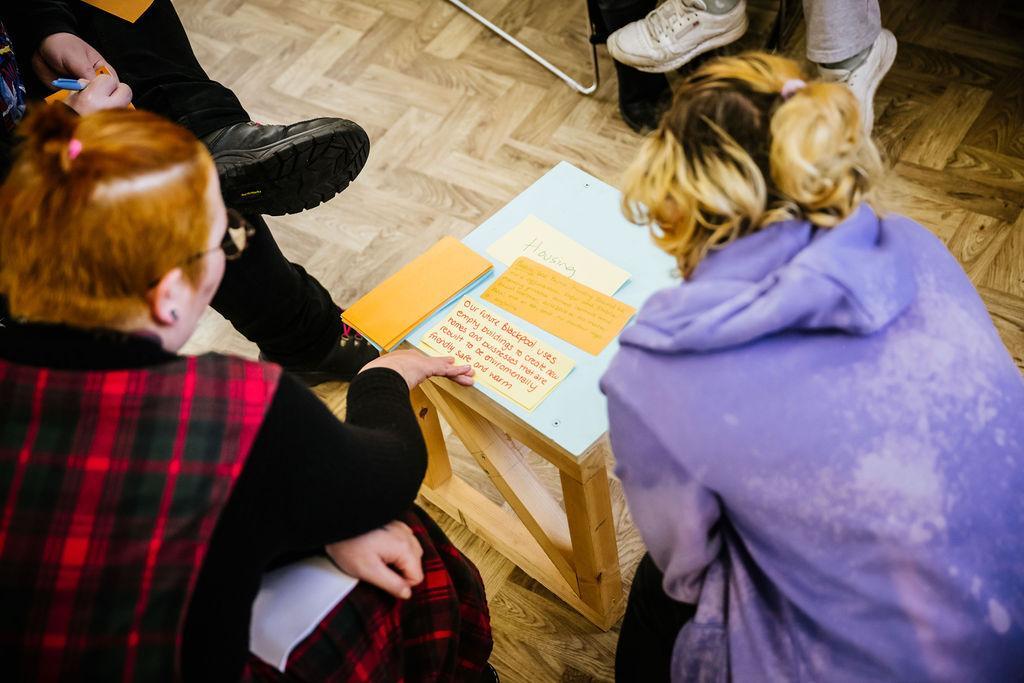


Levelofsupportforrecommendations
At the end of the Community Conversation, participants voted on their level of support for each recommendation. They used a four-point scale:
● Love it - great, fully support this idea
● Like it - might not have been your first choice but you think it is a good idea and would be happy to see it happen
● Live with it - definitely not your first choice, but you could live with it if it happened
● Loathe it - I really wouldn’t want to see that happen in Blackpool
Make sure housing is adequate, affordable and suitable for everyone, making it more environmentally sustainable for the future
The council to use incentives or put pressure on private builders to build with a high standard of energy efficiency and sustainability
The council, Blackpool Transport and private business strengthening existing public transport and making it more accessible, cheaper and environmentally friendly
More green spaces in built up areas by planting street trees and depaving areas
Utilising back alleys and public spaces for community gardens, wildlife corridors and relaxing areas to help mental health
The council and private business to run incentive programmes
Educating children in climate change
The council to communicate better to ensure services are talking about interconnected issues
People with lived experience to be actively involved in decision making within steering groups for different departments to build and develop an overall plan for community engagement and environmental changes
Visioning mindmaps: Blackpool 2035
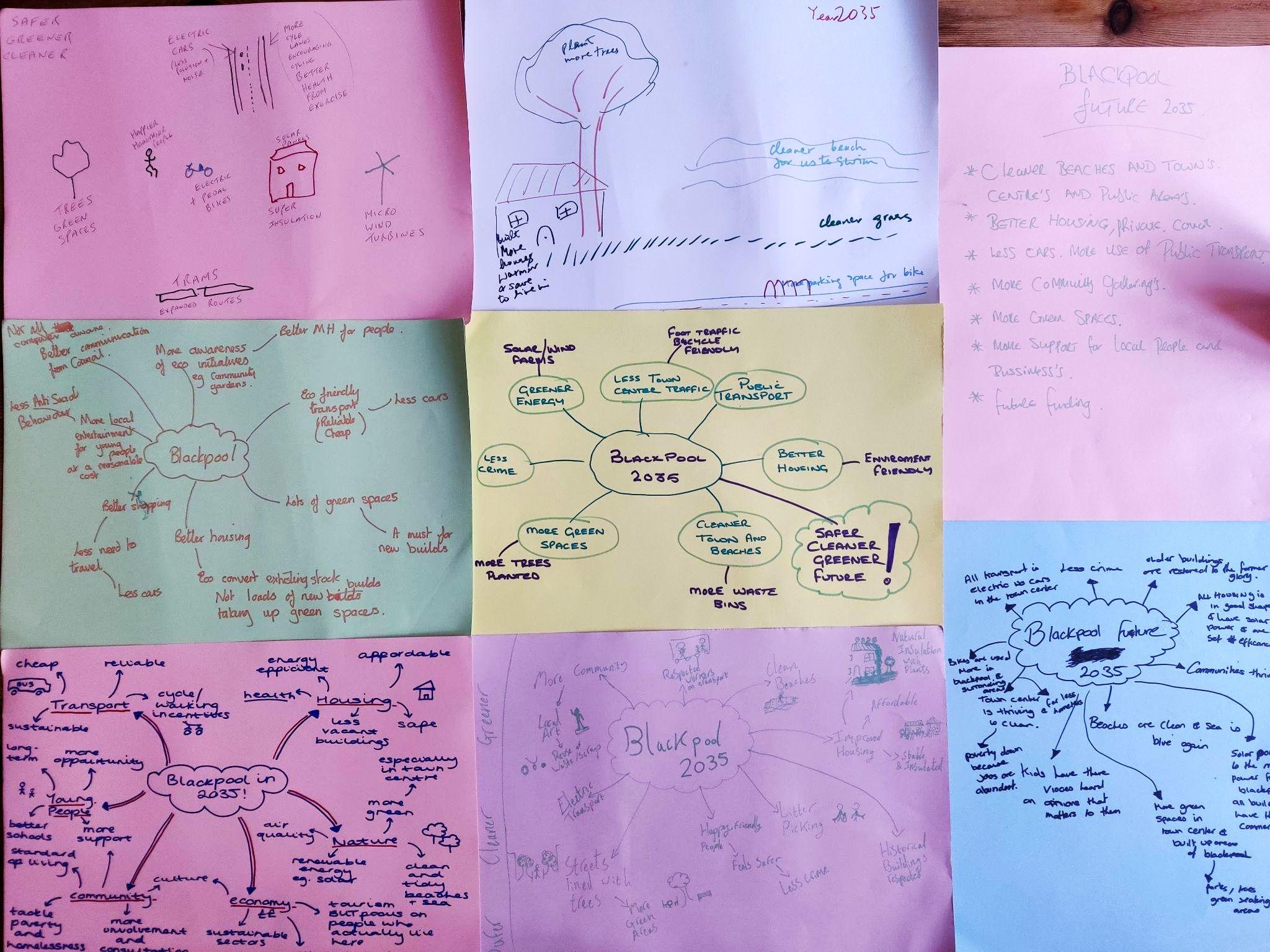


NetZeroLivingprogramme
This project was funded by Innovate UK as part of the Net Zero Living programme which aims to help regional authorities accelerate the transition to net zero.
Involve, Forum for the Future, Ipsos and Quantum Strategy & Technology were appointed to support 25 ‘Fast Follower’ local authorities with their work on visioning and citizen engagement.
Around a third of the UK’s carbon emissions are dependent on sectors that are directly shaped or influenced by local authority practice, policy or partnerships. Many of the technological solutions needed to move places to net zero already exist, but local authorities face many challenges and barriers when trying to deliver these solutions at the scale needed.
The cohort of 52 funded places across the UK are delivering projects to overcome the non technological barriers to delivering net zero in a place.


